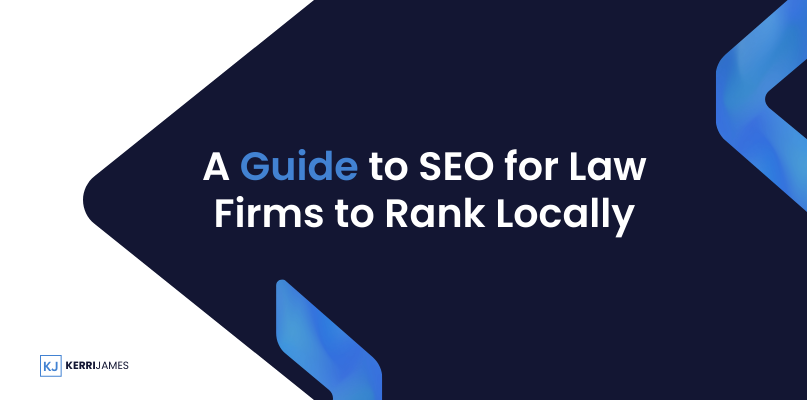In today’s digital age, having a strong online presence is essential for law firms looking to attract new clients. Search Engine Optimization (SEO) is a critical component of this online presence, helping your firm to rank higher in search engine results and, more importantly, to rank locally where potential clients are searching for legal services in their area. Local SEO is especially crucial for law firms, as most people seek legal services close to where they live or work.
This guide will walk you through the key strategies for optimizing your law firm’s website to rank locally, helping you to attract more clients from your geographic area and grow your practice.
Understanding Local SEO for Law Firms
What is Local SEO?
Local SEO focuses on optimizing your website so that it ranks well in local search engine results. When someone searches for a law firm or legal services near them, local SEO ensures that your firm appears in those search results. This is particularly important for law firms because legal services are often tied to specific locations due to jurisdictional laws and the need for face-to-face consultations.
Local SEO includes optimizing your Google Business Profile (formerly known as Google My Business), using local keywords, obtaining online reviews, and ensuring your firm’s name, address, and phone number (NAP) are consistent across the web.
Why Local SEO is Important for Law Firms
The legal industry is highly competitive, and many potential clients use search engines to find local legal services. A strong local SEO strategy helps ensure that your firm is visible when potential clients search for services in your area. Local SEO can lead to increased website traffic, more client inquiries, and ultimately, more business for your firm.
For example, if someone searches for “personal injury lawyer near me” and your firm is optimized for local SEO, your firm is more likely to appear at the top of the search results, increasing the chances that the searcher will contact you.
Optimizing Your Google Business Profile
Claim and Verify Your Google Business Profile
Your Google Business Profile is a crucial tool for local SEO. It allows your firm to appear in local search results and on Google Maps, making it easier for potential clients to find you. If you haven’t already, the first step is to claim and verify your Google Business Profile.
To do this, go to Google Business and follow the instructions to claim your profile. Once claimed, you’ll need to verify it, usually through a code sent by Google to your business address.
Optimize Your Google Business Profile
Once your profile is claimed and verified, it’s time to optimize it. Here are the key areas to focus on:
- Accurate NAP Information: Ensure your firm’s name, address, and phone number are correct and consistent with the information on your website and other directories.
- Business Categories: Select the most relevant categories for your firm. For example, if you specialize in personal injury, choose “Personal Injury Attorney” as your primary category.
- Business Hours: Make sure your business hours are accurate and up-to-date.
- Photos: Upload high-quality photos of your office, team, and any other relevant images. This makes your profile more engaging and trustworthy.
- Services and Descriptions: Add a detailed description of your services, including keywords relevant to your practice areas and location.
- Posts: Use Google Posts to share updates, blog posts, or special offers. Regularly updating your profile with posts can keep it fresh and engaging.
Encourage Client Reviews
Client reviews are a powerful factor in local SEO. Positive reviews not only improve your firm’s reputation but also boost your ranking in local search results. Encourage satisfied clients to leave reviews on your Google Business Profile. Make it easy for them by providing a direct link to your review page.
When responding to reviews, be professional and thank clients for their feedback. Address any negative reviews promptly and professionally to show that you value client satisfaction.
Using Local Keywords
Researching Local Keywords
Keywords are the foundation of any SEO strategy. For local SEO, you need to focus on keywords that include your location and the services you offer. Start by researching local keywords using tools like Google Keyword Planner, Ahrefs, or SEMrush.
For example, if your firm is located in Miami and specializes in family law, relevant local keywords might include “Miami family lawyer,” “divorce attorney in Miami,” or “child custody lawyer Miami.”
Incorporating Local Keywords
Once you’ve identified your target local keywords, incorporate them strategically throughout your website. Here’s how:
- Title Tags and Meta Descriptions: Include your local keywords in the title tags and meta descriptions of your web pages. This helps search engines understand the relevance of your content to local searches.
- Headings: Use local keywords in your H1, H2, and H3 headings to reinforce the content’s relevance to your location.
- Content: Naturally incorporate local keywords into your website content, including service pages, blog posts, and FAQs. Be sure to provide valuable information that answers potential clients’ questions.
- Alt Text: Include local keywords in the alt text of your images. This not only helps with SEO but also improves accessibility.
Creating Location-Specific Pages
If your firm has multiple locations or serves different cities, consider creating separate pages for each location. Each page should be optimized with location-specific keywords and content relevant to that area.
For example, if your firm has offices in Miami, Fort Lauderdale, and West Palm Beach, create individual pages for each city. This can help you rank for searches like “family lawyer Fort Lauderdale” or “divorce attorney West Palm Beach.”
Building Local Citations
What Are Local Citations?
Local citations are online mentions of your law firm’s name, address, and phone number (NAP). They often appear in online directories, social media profiles, and other websites. Citations help search engines verify your firm’s location and boost your local SEO rankings.
How to Build Local Citations
To build local citations, start by ensuring your NAP information is accurate and consistent across the web. Inconsistent information can confuse search engines and harm your local rankings.
Next, submit your firm’s details to online directories such as Yelp, Avvo, and legal-specific directories like FindLaw or Justia. Also, ensure that your information is correct on social media platforms like Facebook and LinkedIn.
The more consistent and accurate citations you have, the better your chances of ranking higher in local search results.
Managing Your Online Presence
Regularly monitor your citations to ensure they remain accurate. If your firm moves or changes its phone number, update this information across all platforms as soon as possible. Tools like Moz Local or Yext can help you manage and update your citations efficiently.
Creating Local Content
The Importance of Local Content
Creating content that resonates with your local audience is a key component of local SEO. Local content helps establish your firm as a trusted authority in your area and drives more local traffic to your website.
Ideas for Local Content
- Blog Posts: Write blog posts that address legal issues specific to your area. For example, you could discuss how local laws impact personal injury cases in your city or provide tips for navigating family law in your state.
- Case Studies: Showcase successful cases that you’ve handled in your area. Highlighting local cases can demonstrate your firm’s expertise and connection to the community.
- Community Involvement: Share news about your firm’s involvement in local events, charities, or legal workshops. This not only boosts your local SEO but also enhances your firm’s reputation in the community.
- FAQs: Create a frequently asked questions (FAQ) section that addresses common legal questions from local clients. Use this opportunity to incorporate local keywords and provide valuable information.
Leveraging Backlinks for Local SEO
The Role of Backlinks
Backlinks, or inbound links from other websites to yours, are an important factor in SEO. High-quality backlinks signal to search engines that your website is credible and authoritative. For local SEO, backlinks from local websites can significantly boost your rankings.
Building Local Backlinks
Here are some strategies for building local backlinks:
- Local Directories: As mentioned earlier, ensure your firm is listed in local directories. These directories often provide valuable backlinks.
- Local News and Media: Reach out to local newspapers, blogs, or radio stations to feature your firm in their content. This could be through an interview, a guest article, or a sponsorship.
- Partnerships and Sponsorships: Partner with local businesses or sponsor community events. Often, these partnerships include a mention and a backlink on the organization’s website.
- Guest Blogging: Write guest posts for local blogs or websites relevant to your practice area. Ensure that your post includes a link back to your firm’s website.
Monitoring and Measuring Your Local SEO Success
Tracking Your Progress
To ensure your local SEO efforts are effective, it’s important to monitor and measure your progress. Use tools like Google Analytics, Google Search Console, and Moz Local to track key metrics such as website traffic, keyword rankings, and local search visibility.
Adjusting Your Strategy
SEO is not a one-time effort but an ongoing process. Regularly review your performance data and adjust your strategy as needed. If certain keywords are not driving traffic, consider refining your content or targeting different keywords. If your Google Business Profile isn’t generating as many leads as expected, revisit your profile and consider adding more photos, reviews, or posts.
The Verdict
Local SEO is a powerful tool for law firms looking to attract clients in their geographic area. By optimizing your Google Business Profile, using local keywords, building citations, creating local content, and leveraging backlinks, you can improve your firm’s visibility in local search results and drive more qualified leads to your website.
Remember, SEO is an ongoing process that requires regular monitoring and adjustment. Stay committed to refining your strategy, and over time your firm can build an impressive online presence.










